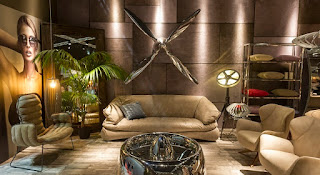Radiant Castellammare del Golfo
 |
| Warm, sun-drenched and picturesque. |
The sun is not the only radiant energy in the picturesque Sicilian seaside town of Castellammare del Golfo — it was recently voted among the friendliest cities in Italy as its time-honored way of life, warm welcome and scenic setting at the foot of Mont Inici in Trapani province draw increasing numbers of domestic and international tourists.
It is the kind of picturesque Sicilian town where you’d either like to buy a house, spend your honeymoon or simply enjoy a vacation. Everything is built of ivory-colored stone, blinding in the sun and contrasting splendidly with the endless blue of the sea and sky.
Less known than the nearby tourist hotspots Favignana, Erice and San Vito Lo Capo, Castellammare del Golfo seems to simply try harder. Its grocers, butchers and restaurateurs offer their local products and fare with a smile and a story about the town or their many relatives living in the U.S. One of six brothers, a longtime downtown butcher eagerly tells how he is the only one of the siblings still living in Castellammare. The others have gone on to productive lives in the U.S., raising children that include lawyers and PhD researchers.
The Castellammare del Golfo of today is noted in Italy as the birthplace of Sergio Mattarella, current president of the republic, but the town would have been a well-known name to many of the 7 million residents living in New York City in 1930. It was used in blaring newspaper headlines and sensational stories about the so-called Castellammarese War raging between mafia factions loyal to either Joe “The Boss” Masseria or Salvatore Maranzano, both immigrants of from the coastal region of northwestern Sicily, who were then locked in a battle to become capo di tutt’i capi.
 |
| Narrow, ancient streets. |
Also along Via Garibaldi we find exquisite friends. A retired local gentleman invites us to visit the Società operaia di mutuo soccorso (Italian Workers Mutual Aid Society) where after a lifetime of work he and his buddies enjoy spending their afternoons reading or playing cards and billiards. He proudly shows us a book of photos on the Castellammaresi in the U.S. with beautiful black-and-white portraits of immigrés who did their part to make America great.
According to the ancient historians and geographers Ptolemy, Diodorus and Strabo, Castellammare was first called Emporium Segestanorum, or port for the nearby city Segesta. Arabs occupied the town in 827, calling it Al Madarig, or The Steps, due to the steep street leading from the harbor and castle fortress they built. The citadel was later enlarged by the Normans. Today the structural part of the Arab-Norman castle, which gives its name to the town, draws the most attention from tourists together with La Chiesa Madre, the main church, also located on Via Garibaldi. Built in the sixth century, it contains valuable frescoes.
As the town transitions from agriculture and emigration to tourism, many residents are keen to try their hand at a range of entrepreneurship. Antonio Como not only operates the new Opera Suites bed and breakfast nestled amid the stone steps of Via Bellisario, he has a computer shop, and car and boat rental businesses. On a recent Sunday he still bustled about caring for guests even as his family prepared for his son’s Holy Communion, when much of the town’s population gets decked out in their best finery and later packs into the local restaurants.
Francesca Pilara opened a lovely new deli, Il Bar del Centro, this year on Via Garibaldi, complete with a fast Wi-Fi connection, as she embraces the tourist trade. Francesca and her three cute kids Noemi, Adele and Gabriele make you feel welcome the minute you walk in. Upstairs the Pilara family runs a cozy bed and breakfast, La Casa Vacanze Casa del Centro.
“Tourism has grown considerably in the past two years,” says Francesca. “In the previous decades only Germans and French put an eye on Castellammare, but today tourists actually come from all over the world.”
 |
| Night view of the the Arab-Normal castle on the left, which gives the town its name (photo: Salvatore Giallo). |
And the food is great everywhere, starting with even a pocket-sized salumeria. We followed the smell of freshly baked bread as we made our way to the counter, where a sweet nonna prepared a delicious sandwich, or pane cunzato in the Sicilian dialect, made from a loaf of freshly baked bread drizzled with olive oil and layered with sliced tomatoes, mozzarella, mayonnaise, your favorite prosciuttos, salt, pepper, oregano and a few anchovies. It too is part of the warmth that takes Castellammare del Golfo into your heart.



Comments
Post a Comment